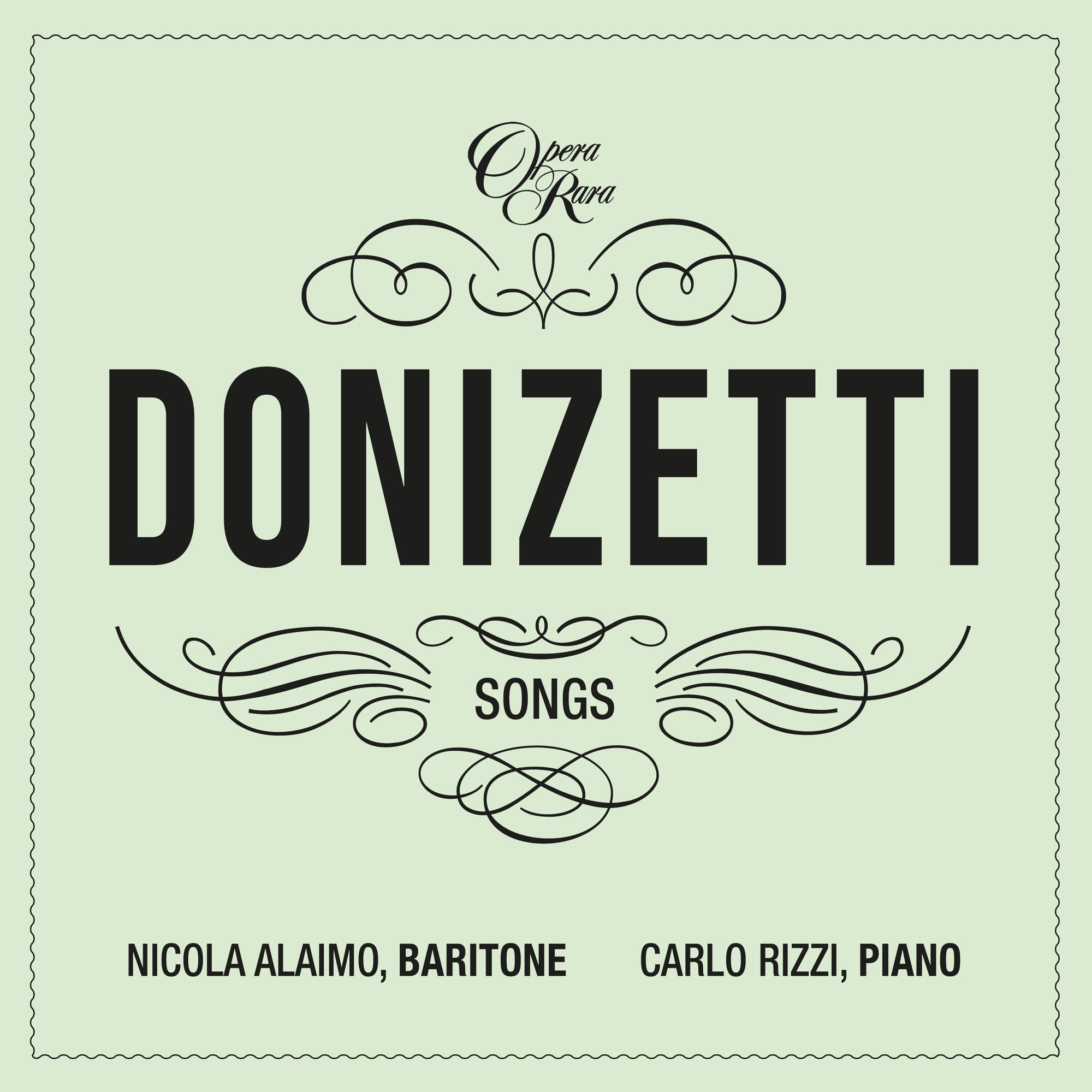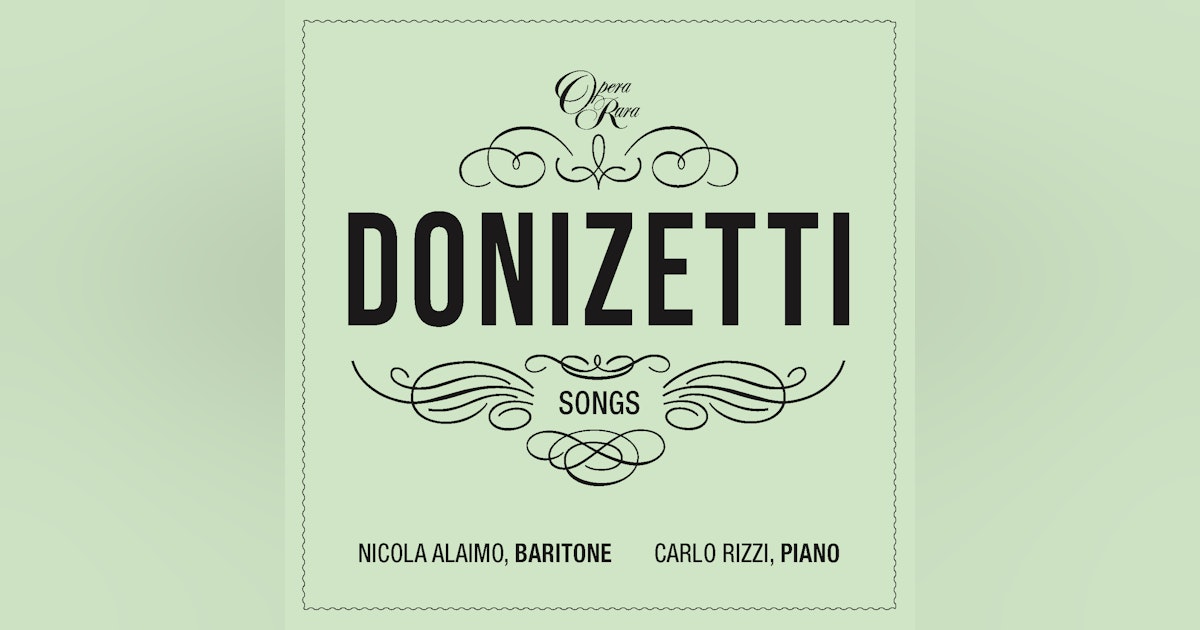Donizetti Songs #2: Nicola Alaimo joins Carlo Rizzi
Another fabulous, and fabulously useful, release in the Donizetti Song Project

Looking at Nicola Alaimo's repertoire and performances, his sheer number of Donizetti roles is only equalled by those of his Rossini performances; h is a major interpreter.
The first song, Al campo della gloria, has material first used in an act 1 duet between the titular Belisario and Alamiro in Belasario; this is heard in a more domestic stain here, though, and therefore more reined-in. Alaimo has the most amazing voice, honeyed, expensive and yet clearly capable of great strength. And while the music comes from the opera house, Rizzi's close is straight from the salon:
... and while I'm aware there is a fabulous recording of Belisario on Opera Rara conducted by Sir Mark Elder, here's also on with Giuseppe Tddei as Belisario and Umberto Grilli as Alamio:
Giuseppe Taddei - Belisario, Umberto Grilli - Alamiro Gavazzeni, Orchestre et chœur du Teatro La Fenice de Venise 1969
... and I will share the Elder after all - it's tremendously exciting (particularly towards eh end) and what deal Elder gets from the BBC Symphony Orchestra at the close. Also how could I not: the soloists are one Nicola Alaimo, plus tenor Russell Thomas:
BBC Symphony Orchestra, Sir Mark Elder Nicola Alaimo Russell Thomas
Alaimo has a golden baritone: as we can hear in the slower, and lovely, Ov'è la voce magica (Where is the magical voice), which comes as a pair with the next song, Il mio grido io get al venti (I cast my cry to the winds). The piano part offers a hesitant gesture, bu one full of hope, post-Schuberian in demean, perhaps. The swell of emotion is lovely. Notice how Alaimo's voice retains its beautiful tone throughout his range:
Here is performance (along with five other songs) with score: the soprano is Ji Young with Mi Young on piano:
It is complemented by the “romanza moresca,’’ full of brash effects, Il mio grido io getto ai venti. Alaimo sings with great character; the song is illustrative, a narration, and Alaimo certainly tells the story all of the lover searching fo his lover, Juannita:
This latter song, incidentally, was featured in an Opera Rara salon concert given by baritone Lluís Calvet I Pey with James Southall on piano (the event was curated by Roger Parker):
“Oh, j'aime trop pour étre heureux” (Ha, I love too much to be happy) is the refrain of the next song. sung in French, Dans un salon quelqu'un nous regrade, which features viola obbligato, perfumed here by Abigail Fenna, Principal Viola of the Royal Philharmonic Orchestra. The viola is mainly arpeggios when the voice is in action, but provides eloquent transitions between stanzas:
Alaimo injects some improvised ornamentation into Questi capegli bruni (those brown locks), a simple strophic song from the 1830s. Simple it might be structurally, but the turns to the minor are mightily expressive:
Alaimo is raher finer here than Alfonso Antoniozzi, with pianist Loris Peverada, on is 2011 Kicco Classic release of “rare unpublished works”:
A song of lovers parting, Tu pars, il faut te dire adieu (You are living, I must bid you farewell) is tender in demeanour, honeyed here in delivery, and a clear miniature masterpiece. Alaimo's moments sans piano towards the end of the song is high beauty:
This song and Più che non ama un angelo (More than an angel loves) are basically two sides of the same coin, but with the add-on of an obbligato instrument, here the cello (well played on this recording by Hetty Snell). Here's the Opera Rara film of this song. I wonder, does Donizetti approach Verdi, or is it just the use of a common trope, at “Vissi nel tuo respiro, / Ma un core senza palpiti” (I lived in your breath):
The beautiful arietta, A piè del mesto salice (At the foot of the sad willow) sets a text by Carlo Popoli (librettist of Bellini's I puritani). This is.truly special song, the darkening for th third stanza, very touching here before the rather more jaunty final section as the protagonist envisions his beloved's dulcet tons. The text is not the happiest: “At he foot of this sad willow / May my ashes be buried”. But Donizetti's setting, from the 1830s, is masterly:
The next song is a companion piece to text by the same poet, O Chloe, felicia di questo core, a wide-ranging song of much beauty.
It comes a bit of surprise to hear a t song in German! I might well originate in a composition with Italian text, tht is now lost. Ob die Stürmen auch wüthen (Even if the storms rage). It has a lovely godless "refrain" ht echoes the pianos' rather jolly contribution to this tale of seafaring discovery. Great fun:
Love and Death are so closely related in art (and generally): Odi d'un uomi che muore (Hear from a dying man) is exactly that, a portrait of a dying man in which the protagonist's struggle between abject despair aad the search of consolation is laid bare. The song is also known as Amor e Morte. Donizetti's invention is phenomenal, offering one of his great melodies (to my was anyway);
Daniel de Fry is the harpist for Non v'è name, on v'è fato (There is no god, there is no fate) a song of longing for a beloved and a meditation on how much thy are in the protagonists thoughts.
The charmingly simple Non sdegnar, vezzosa Irene (Do not scorn, lovely Irene) , one of Donizetti's early songs, act as contrast (the singer's range is restricted to within one octave for that one); and it is fascinating to hear one in Sicilian dialect, Nici, ss'occiuzzi, calali (Nici, lower your eyes);
The early song, Le Dernier chant du Troubadour, while strophic (with the regularity disturbed later on) feels like a narration, so touching here. The below is a video snippet: you can hear the full song here.
A crusader leaves his beloved in Colle plume sul cimiero (With plumes on his helmet), a song of leave-taking:
You would have thought a troubadour should speak of similar lore, but this one in Era notte a la campagna (It was night and the church's clock ...) is down on his luck and looking for a place to stay ... the quirky text by Lorenzo Borsini is matched by Donizetti's imagination (there's even some knocking, presumably on the piano, at one point, plus vocal imitations!). It is a lot of fun, and Alaimo and Rizzi vie for who can inject the most character:
A popular type of song, or indeed aria, of this era is the preghiera, or prayer. And here is one, dating from Donizetti's Paris years, but set in Italian: Dio! Che col cento moderi (God, who with a sigh controls / The anger of the turbulent sea):
Nice that Opera Rara balances that with a simple salon song, and yet even here Donizetti's melodic ease shines: Quando da te lonatno (When I went fa away from you). But it is the flow of invention that is Je vais quitter tout ce qui je t'aime (I am going to depart from all that I love) that is surely touched with the hand of greatness, full of sophisticated touches:
The next song is harmonically volatile while singing the praises of Nice (the place): Nice s'io moro. How easy Alaimo makes the melody sound, singing to the the cruel beauty of Nice (“Nice crude beltà”):
Completing the piano part of Si soffre una tiranna (One can suffer a cruel woman) must have been one of the easier musicological tasks oe could be comforted with, but the song is a delight, carrying those characteristic Donizetti harmonic twist.
It is the interior aspect of Donizetti that always appeals. And that is on display in Non prego mai, né pianto (Neither prayers nor tears have ever move the Fates to pity), a song with sudden little quirks (such as a sudden thinning of texture):
The next song is heard in its full form probably for the first time since the 19th century. A gently rocking motif illustrates a bot in the waves in Mentre al care lido (While the boat draws away) before the music suddenly dances:
The last song on the disc is only two and a half minutes but carries worlds of emotions: Quando ben mir t'adoro (How much, my beloved, I adore you). The vocal line becomes ever more florid as passions rise to the surface:
Another fabulous, and fabulously useful, release in the Donizetti Song Project. This lovely disc is available at Amazon here.


